The use of onion peels for the garden
Onion peels have properties no less valuable than the bulbs themselves. It is used in the treatment of bronchitis, skin diseases, edema and allergies. And the husk is an excellent assistant in caring for plants.
Infusions and decoctions of dry scales are used for watering and spraying plantings to protect against fungal diseases and repel pests. In addition, the rich composition of the mixture makes it an excellent fertilizer. You will find information on ways to use onion peels for your vegetable garden or garden in this article.
Useful properties and composition of onion peel
How are onion peels useful for the garden? Onion peelings, which are usually thrown away, contain vitamins A, B, C, E, PP, carotene, phytoncides, potassium, iron, calcium, silicon, phosphorus, magnesium.
When applied to the soil as fertilizer, these valuable substances benefit garden crops. Let us list the beneficial properties of the substances included in onion peelings:
- Carotene is an antioxidant and a strong immunostimulant. It increases plant resistance to disease and fights fungal and bacterial diseases.
- Phytoncides are substances with protective properties. Suppress the growth of pathogenic microorganisms, in particular fungal spores.
- B vitamins are an effective means for accelerating the growth of seedlings. Strengthens the roots and stems of plants.
- Vitamins of the PP group stimulate plant growth by accelerating the conversion of nitrogen into oxygen. Strengthen the root system and tops.
Thus, husk decoction is a natural helper for the gardener from early spring until autumn.
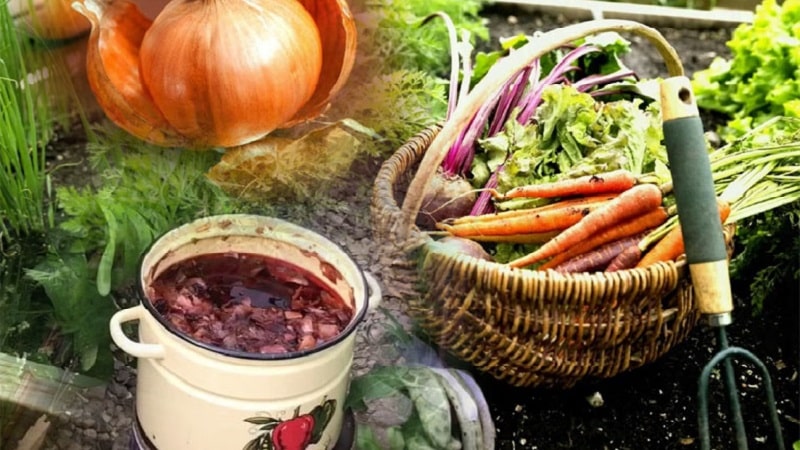
Benefits of fertilizing with onion peels
The main advantage of the product is its naturalness. Using a decoction allows you to get a harvest of environmentally friendly products that you can eat yourself and give to children.
Attention! Onion infusion is one of the few means that can be used to treat tender young seedlings. It will protect against diseases and pests, strengthen the root system and greenery of plants.
Another advantage of the product is its availability.. We all use onions to prepare various dishes in the kitchen. Collecting and storing husks in winter will provide a safe and reliable means for feeding and protecting plants.
And finally, Infusion of onion peelings is easy to prepare and use.
For which plants is the product useful?
Onion fertilizer is universal and is used in growing any garden crops.
Start using the product by growing seedlings. Subsequently, adult plants are treated with the infusion.
Infusion and decoction of husks as fertilizer
The rich vitamin and mineral composition of the product allows it to be successfully used as a fertilizer for vegetable, fruit and flower crops.
For cucumbers
A product based on onion peels is suitable for feeding cucumbers. On the one hand, plants receive nutrients, and on the other, protection from pests.
The infusion also helps with yellowing of cucumber leaves.. Add two handfuls of husks to 10 liters of water, bring to a boil and cool. The cooled mixture is diluted in water - 2 liters per bucket - and the cucumber beds are watered.
For tomatoes
When growing tomatoes, the product is used from the moment shoots appear. until fruiting time.
Spraying tomato plantings with onion infusion accelerates the formation of ovaries and helps with yellowing of the tops.
Advice. When planting tomato seedlings, add dry peels mixed with humus to each hole. This will help protect plants from fungal diseases.
When used as fertilizer, pour 0.5 liters of infusion for each bush.
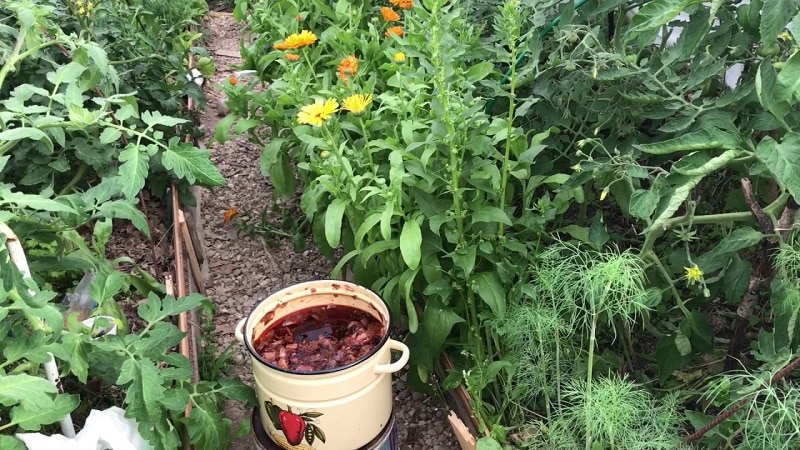
For strawberries
Infusion and decoction of onion peelings is an effective remedy for increasing strawberry yields and pest control.
When used as fertilizer, the liquid is poured under the root of each bush.. To protect against pests, bushes are sprayed with a spray bottle, making sure that the product also gets on the inner surface of the leaves.
For indoor plants
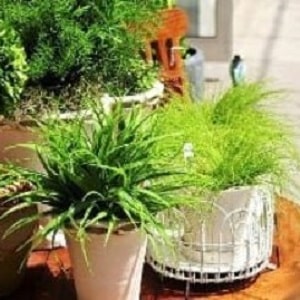 Onion remedy is also useful for indoor plants. Using a decoction when watering reduces the risk of developing root rot. In addition, this is an excellent fertilizer, for example, for capricious orchids.
Onion remedy is also useful for indoor plants. Using a decoction when watering reduces the risk of developing root rot. In addition, this is an excellent fertilizer, for example, for capricious orchids.
The decoction is prepared like this. A handful of crushed husks is mixed with 1.5 liters of water, brought to a boil and boiled for 5 minutes. Then cool and filter.
The decoction is watered over plants and used for spraying leaves.. This treatment saturates the flowers with minerals and vitamins and protects them from diseases and pests.
Reference. You should not prepare the decoction for future use. It spoils quickly even when stored in the refrigerator.
Watering and spraying home plants with decoction carried out once every 2-3 weeks.
For cabbage
It is useful to water cabbage plantings with infusion 2-3 times a season. Such fertilizing heals the soil, nourishes it with useful substances and increases productivity.
For potatoes
He also likes fertilizing with onion fertilizer. potato. The infusion is added to water for irrigation.
Onion peels are also effective in controlling potato pests., including wireworm and Colorado potato beetle. To repel insects, dry scales are added to the holes during planting and buried in the ground next to the potato bushes.
Other uses of onion peels:
The use of onion peels in folk medicine
How to use onion peel for prostatitis
What is the benefit of onion peel decoction and how to use it
Application for pest control
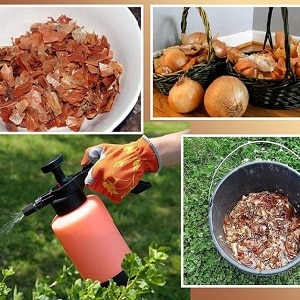 Onion peelings are reliable assistants in the fight against insect pests. Onion infusions and decoctions are used to protect plants from the Colorado potato beetle, wireworm, aphids, thrips, flea beetles, and spider mites.
Onion peelings are reliable assistants in the fight against insect pests. Onion infusions and decoctions are used to protect plants from the Colorado potato beetle, wireworm, aphids, thrips, flea beetles, and spider mites.
A decoction for preventive treatments is prepared as follows:. A handful of husks is poured into 5 liters of water and boiled for 5-7 minutes over low heat. The resulting mixture is infused for 4-5 hours and filtered. Before use, the decoction is diluted with water (1 liter of decoction per 5 liters of water).
The product is sprayed onto the leaves of plants from a spray bottle or watered from a watering can.. Treatment is carried out once a week.
Another way to use husks to repel pests – introducing dry cleaning into the soil when digging or into holes before planting seedlings. In this case, the husks are crushed and mixed with humus and ash.
If the plants are already affected by pests, prepare a more concentrated infusion. The husk is mixed with water in a ratio of 1:2 and left for two days. Then filter, dilute with water (1 liter of infusion per 2 liters of water) and add liquid soap for better contact with the surface of the leaves.
When spraying, the leaves are treated on both sides. Treatment of the area is repeated after a week.
In the fight against disease
Onion infusions and decoctions are an effective means of protecting garden crops from diseases such as black leg, various types of rot, powdery mildew, bacteriosis.
When used in greenhouses and greenhouses, the product prevents proliferation of pathogenic microorganisms, thereby protecting cucumbers and tomatoes from diseases.
To protect against diseases, plants are watered with infusion or decoction once every two weeks.. Periodic spraying of plantings both in protected and open ground is also effective.
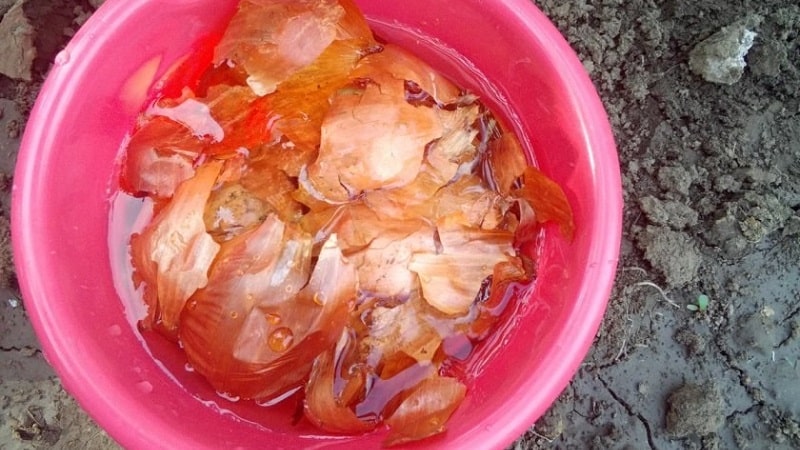
As mulch
Dry scales are used not only to repel pests, but also as mulch. In this case, crushed dry husks are scattered around the plants.
Attention! Onion mulch not only protects the soil from drying out and plants from overheating, but also repels insect pests.
If you collect dry husks throughout the year, this volume is enough for the entire site.
Use in growing seedlings
Watering the seedlings two or three times with an infusion of onion peels will saturate the soil with microelements and protect tender sprouts from fungal diseases.
The product also helps with yellowing of plant leaves, which indicates a lack of nutrients in the soil.
Need to know! Infusions and decoctions based on onion peels are used only fresh. Stale fertilizer will not only not benefit the plants, but can also cause harm.
Here is a recipe for a nutritious infusion for seedlings with husks. Pour two handfuls of onion peelings into a liter of boiling water and add 1 tbsp. l. ash. Infuse the mixture for three days. Dilute the finished infusion with water 1:3 and water the plants.
This feeding will protect the seedlings from diseases and at the same time serve as a growth stimulator.
Recommendations for harvesting husks
If you decide to prepare onion peels for future use and use it in the garden and garden, make sure that it is a healthy raw material.
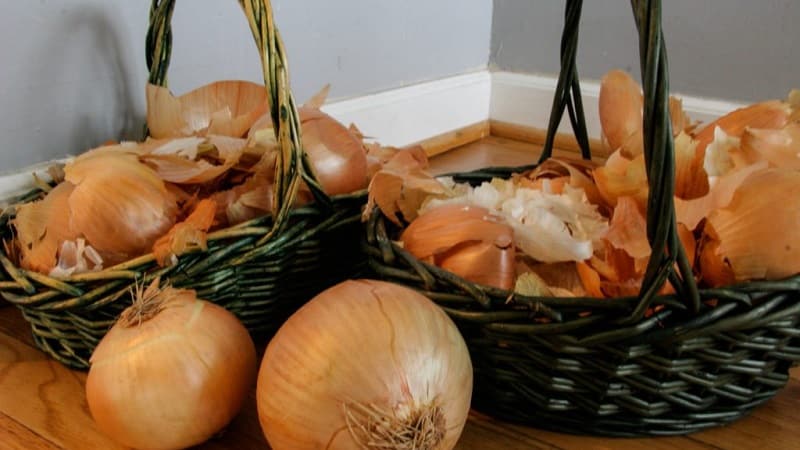
It is better to harvest peelings from onions grown in your own garden or verified farmers. When grown on an industrial scale, vegetables are treated with chemicals, which are subsequently absorbed into the peel.
The bulbs must be healthy, without signs of rot.. The color of the scales is uniform, golden, without spots.
It is not recommended to wash onions before harvesting., just wipe the heads with a dry cloth to remove dust and dirt.
The collected husks are placed in a container or fabric bag.. Store raw materials in a dry place at room temperature until spring.
Conclusion
The average Russian family eats more than 100 kg of onions per year. By collecting and storing onion peelings in the fall and winter, you will provide yourself with a natural, effective and inexpensive means for feeding and protecting plants in the spring and summer.
Products prepared from dry onion scales are suitable for feeding and protecting almost all plants on the site and at home.